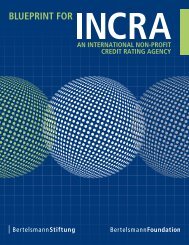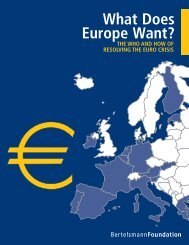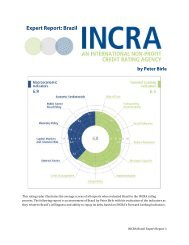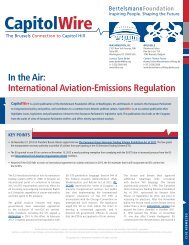BF-FieldManual-FEB13 -3.pdf - Bertelsmann Foundation
BF-FieldManual-FEB13 -3.pdf - Bertelsmann Foundation
BF-FieldManual-FEB13 -3.pdf - Bertelsmann Foundation
- No tags were found...
Create successful ePaper yourself
Turn your PDF publications into a flip-book with our unique Google optimized e-Paper software.
MEMO ONRUSSIAThe State of PlayIn President Obama’s second term,the US will encounter a Russia that isa far cry from the boastful, confidentand assertive country that in early2008 seemed destined to become amajor global player again. For muchof the first decade of the 21st century,Russia experienced explosive economicgrowth thanks to its abundant supplyof hydrocarbons and the rapid rise ofoil and gas prices. Between 2000 and2007 alone, Russia’s real GDP per capitagrew an average of 7 percent a year,with nominal GDP increasing fivefoldsince 2002. 1 In early 2008, Russia heldnearly $162 billion in reserve andnational welfare funds as well as nearly$600 billion in hard currency and goldreserves, an amount exceeded only byJapan and China. 2This economic rise coincided with aforceful return of traditional Russianrealpolitik. Successive rounds of NATOand EU enlargement were viewed asthreats to Russian national security,while perceived Western involvementin the “color revolutions” in formerSoviet states played on fears of Russianweakness. A more confident Moscowflexed its muscle against the West, usingthe state-owned gas company Gazprom’sdominance in the European energymarket as an effective foreign policyweapon. Energy disputes with Belarus(2007) and Ukraine (2009) over pricesand unpaid gas bills resulted in Russiacutting off gas to both countries—and, inturn, to much of the European continent.Moscow showed a willingness to useenergy to gain leverage over EU memberstates, some of which are almost entirelydependent on Russian exports to meettheir energy needs. Russia’s actionscoincided with a growing consensus thatthe US was no longer the sole globalIn President Obama’s second term, the US will encountera Russia that is a far cry from the boastful, confident andassertive country that in early 2008 seemed destined tobecome a major global player again.superpower. This decline paralleled therise of Russia in a new multipolar orderalong with the rest of the so-called BRICcountries (Brazil, India and China).The 2008 global financial crisis hassince fundamentally altered Russia’sview of itself in that international order.The tightening of the global creditmarkets caused the country’s total grosscapital inflows to decline by nearly 40%between 2007 and 2008. 3 A sharp dropin commodity prices, particularly forhydrocarbons, shook an economy thatrelied on oil and gas for more than twothirdsof its export receipts. Russia’s GDPactually declined by 10 percent between2008 and 2009, while unemploymentand inflation increased considerably. 4Russia’s fading fortunes prompted thenpresidentDmitry Medvedev to seek tomodernize and diversify the Russianeconomy. However, the failure of theMedvedev administration to achieveany substantial economic reform andthe return of Vladimir Putin to thepresidency in March 2012 raises doubtsabout Russia’s willingness to continuethe modernization agenda.The Obama administration shouldexpect a Russian state that is a status quopower with rollback tendencies. Russia’sthree sinews of power—its pivotal voteon the UN Security Council, it naturalsresources, and its nuclear arsenal—will guarantee a seat at the table onmajor global issues. But in almost allother measures, Russia is regressing.Economically, endemic corruption, apoor investment climate (capital flighttotaled nearly $80 billion in 2011 5 ) andweak state institutions throw cold wateron Moscow’s modernization agenda.Domestically, the return of Putin tothe presidency prompted proteststhroughout Russia whose size and scopeshocked the ruling apparatus. Theseprotests, and the Kremlin’s politicalcrackdown in response, have throwndomestic stability into question.Internationally, Russia will continue tostruggle to keep pace with more dynamiceconomies and find its influencediminishing in many areas of the world,despite its accession to the World TradeOrganization in 2012. China’s rise in theeast will undoubtedly become a greaterconcern as its global profile increasesand its thirst for energy resourcesleads to an increasing presence in theformer Soviet space in Central Asia.The Arab uprising has seen Moscowlose traditional partners in the region,while its support of the Bashar al-Assadregime in Syria continues to isolate itregionally and internationally. As newgovernments emerge in the Middle East,few countries, if any, will look to Moscowas a model to emulate.European PerspectivesA reconciliation of sorts betweenEurope and Russia has taken place, thefoundation of which was in many wayslaid by the bilateral US-Russia “reset”.EU member states and Moscow havetaken small but important steps to easetensions and solve lingering bilateral6 4Russia






